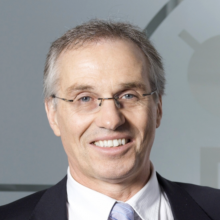Helmut Dosch is Senior Advisor at the Deutsches Elektronen-Synchrotron (DESY), one of the world’s leading accelerator centers. From 2009 to 2025, he served as Chairman of the DESY Board of Directors, guiding the institute through a transformative period of strategic expansion, scientific breakthroughs, and international partnerships.
Prior to his tenure at DESY, Prof. Dosch was Director at the Max Planck Institute for Metals Research and held a professorship at the University of Stuttgart. His academic and research career includes appointments at leading international institutions such as the Institute Laue-Langevin (Grenoble), Cornell University, and the universities of Mainz and Wuppertal.
Prof. Dosch is internationally recognized for his pioneering contributions to x-ray and neutron scattering, particularly in the study of phase transitions in semi-infinite systems, including surface melting phenomena and critical behavior at alloy interfaces. His research has significantly advanced the fundamental understanding of condensed matter systems at surfaces and interfaces.
Beyond his scientific achievements, Prof. Dosch has played a pivotal role in shaping European research infrastructures. He served on numerous high-level advisory and decision-making bodies, including the German Wissenschaftsrat, where he was instrumental in securing approval for the construction of the European X-ray Free Electron Laser (European XFEL). As Chair of the Council of the European Synchrotron Radiation Facility (ESRF), he oversaw the facility’s transition to a cutting-edge 4th generation light source. He was also the founding Chair of LEAPS (League of European Accelerator-Based Photon Sources), a strategic consortium uniting Europe’s major synchrotron and free-electron laser facilities.
Prof. Dosch is a member of several national and international advisory committees and scientific review panels. In recognition of his outstanding contributions to science and science diplomacy, he has received numerous honors, including the prestigious Roentgen Medal of the City of Remscheid and honorary doctorates from TU Dortmund University and the National Academy of Sciences of Ukraine. He is a member of the German National Academy of Sciences Leopoldina and foreign member of the National Academy of Sciences of Ukraine.
He earned his doctorate in physics in 1984 from the University of Munich, with experimental research conducted at the high-flux neutron source of the Institute Laue-Langevin.
